There is a moment in the winter when every angler becomes a caged tiger. There’s an itch that’s impossible to scratch, an ache in the bones that cannot be soothed. It’s part cabin fever, part S.A.D., a malaise that overwhelms the sensibilities and brings a monotone mantra to our lips. I gotta go fishing.
Lucky for me, that itch typically coincides with my best friend Adam’s birthday. And birthdays, according to the unwritten bylaws of the fishing posse to which we belong, are for fishing. Unfortunately for me, his birthday is in February, a month that is more readily associated with ice fishing than casting a fly. The lucky and sane ditch the Northeast in winter altogether, flocking to the warmer climes of The Keys, Abaco, or the Quintana Roo.
We first went to the Farmington in January of 2020. I was working for a gear review outfit in New York City then, and had somehow talked the editor into letting me write an article on winter fishing. With no budget for travel, I did some research and was pleased to discover that the Farmington River was a tailwater fishery and was only a few hours north of Manhattan.
Putting aside all the problems usually associated with dams for a second, Northeastern tailwaters are a special thing, especially those fueled by bottom-release structures. Most of the rivers of New England freeze in the dead of winter, capping off access and eliminating any chance of the sun coaxing aquatic insects from their homes.
But a tailwater like the Farmington is a different ballgame. Geothermal forces keep the water in the reservoir steady – right about 38 degrees – which in turn keeps the river cold in the summer, and, relatively speaking, warm in winter. Being free of ice also means that sunny winter days can invigorate the cold-blooded fish and convince all manner of insects that it’s a good time to hatch (or at least move around).
Of course, we didn’t know this then. Nor did we really care. Our tigers were pacing, and the magazine had just unlatched the cage.
That first year we were more lucky than good. We brought a few fish to hand, and got our photo op for the article. We broke the winter doldrums and created a few memories. Mission accomplished.
We had no idea we’d minted a grueling new tradition.
For the initiated, you know what I mean when I say that fly fishing in the dead of winter can be the pits. Everything is working against you. Everything is slow. Everything is cold. Casting is choked by frozen guides, wading cumbersome by numbing feet. A thought emerges; why would anyone do this to themselves?
By February of 2022 COVID had upended just about everything except fly fishing. Adam made his stand in the city while I had fled Manhattan for the mountains of my youth. But there we were again, jonesing for some action and feeling even more caged than usual. Plus, it was his birthday and, well, birthdays are for fishing.
We decided to meet in the middle – so the Farmington is was.
That year we had much better luck. We’d done a little more research and had time to prepare. We hypothesized that the upper reaches of the river – closest to the dam – would be the warmest, and spent most of the weekend poking around in the shallow runs and slow moving pools.
The weather was fickle, with gusts and squalls giving way to bouts of bright sun. The fish didn’t seem to care. We caught some gorgeous rainbows and enjoyed a day peppered with healthy, well-fed fish. The short fishing window and sub-freezing temps made us appreciate the bend in the rod even more, and made it easy to pack it in early while we still had feeling in our toes.
There is something about shared misery that binds people. It’s what Army drill sergeants rely on to gel slipshod kids into dress-right-dress soldiers. I think it’s why our high school friends will always have a place in our hearts, or co-workers from old shitty jobs.
But choosing to be miserable with people you love is a different matter altogether. I think that’s what makes finding fishing buddies so hard; you must share the same enthusiasm for getting your ass kicked by mother nature. And get our asses kicked we did.
Though in truth, it wasn’t all that bad. We’d rented a room at the Old Riverton Inn which sits a double haul away from the water and whose attached pub – the aptly named Royal Coachman Tavern – comes alive in the evenings with locals looking for bite and whatever’s on tap. The place has a charming quirk you’d expect from a building that’s been around since the late 1700s, and the affable staff turned a blind eye to us marching through the lobby and up the stairs to our room with our waders on. There really is no greater luxury in this sport than a short trip up a flight of stair after eating your fill and washing it down with a seasonal libation.
In 2023 we descended upon the Farmington again, booked the same room, perched up at the same table in the tavern. (These are the makings of traditions.) We were ready; the warmest wool socks secured, the layering game perfected. We learned how to clear our guides by melting the ice with our mouths. We ordered extra breakfast sandwiches and kept them warm on the dashboard vents while we drove from spot to spot. And coffee. Lots of coffee.
Each visit to the river yielded new findings. That year we ventured around a bend in the river we’d always ignored and discovered a deep channel that slithered through a handful of submerged boulders. It was the kind of run that just begs for a streamer. And to our glee, we started catching one trout after another. We laughed like kids as we heaved our flies downstream and teased them back through the gauntlet of trout that had podded up there. Soon we’d forgotten all about our numb digits and the pinholes in our waders that had rendered whole limbs lifeless.
It was only over a drink later that evening at the Royal Coachman that we checked the stocking report and learned that the state had just dumped a few hundred rainbows in that very stretch of water. Our angler-egos were bruised, but not too much to keep us from raising a glass to our success when the next round came.
* * *
Being in love with something like fly fishing is a bittersweet business. You have to come to grips with the fact that for every one day of lights out fishing there will be at least three of getting absolutely skunked waiting for you down the line. You tell yourself that you’ll cherish the good days, but they end too quickly and before you know it you’re driving home trying not to open work emails.
My heart breaks a little each time I break down my rod and toss my soggy waders into the back seat before driving home. But we learn to make peace with heartbreak. The heartbreak of losing a fish, or worse, killing one. The heartbreak of the trusty weathered rod broken in a car door. The heartbreak of knowing that someday you’ll be too frail to bear the beatings of wind and rain, too weak to fish all day without stopping for lunch. The heartbreak of discovering that one day you just can’t fish at all, or worse, have no one left to fish with.
* * *
When February rolled around this year the outlook was gloomy. Temps in the high twenties and little to no sun. But birthdays are for fishing. Damn the torpedoes.
Even a mediocre fishing report has the ability to raise one’s spirits. Throw in a picture of a beefy brown trout – the kind we’d tangled with before – and we’d wade through hell and back for a chance to make a cast. In the days leading up to this year’s outing our inboxes were ablaze with photos of recent catches posted on guide accounts, rumors of hatches, and up-to-the-minute radar readouts on wind, precipitation, and temperature.
We spent the first morning scouting, a tactic we were happy to employ with the mercury nudging twenty degrees. We ducked into pull offs and scrambled down drainages. We slugged coffee and scanned for signs of life. We were Holmes and Watson, and the game was afoot. By noon we were waist deep.
For the next two days we waded. Everything was slow. Everything was cold. Casting was choked by frozen guides, wading made cumbersome by numbing feet. Dark thoughts swirled; what the hell are we doing?
At one point a couple of bootfoot spin fishermen popped from the bank and trudged into the run we were fishing, zipping their lures to the far bank with ease. I got pissed, then jealous. But I just stood quietly sucking on my frozen guides like a petulant child daydreaming of flats boats and drinks with little umbrellas in them.
Overcast winter days play tricks on your sense of time. It’s easy to get lost in the diffusion, disconnected from the slow shuffle of shadows that predict the coming of night. Instead, you feel it. Suddenly it’s cold and you realize the sun’s behind the hill and you’re standing in the middle of a freezing river and the trip is almost over. And that’s usually when someone hooks into a fish.
I hadn’t seen Adam make the cast, or mend the line so that the sink tip would pull the streamer down into the seam. I hadn’t heard the thrum of the line in the guides as he teased it slowly across the current. By the time I turned, all I saw was the proud rod, nodding excitedly downstream.
After a short tussle we landed a beautiful wild brown, its blue cheek shining in the last bits of light.
In the grand scheme of things, our annual ritual isn't just about battling the elements or tricking trout; it's a testament to grit, a bit of madness, and the glue of friendship that holds it all together. So let the uninitiated shake their heads. Because no matter how absurd it seems, this is our kind of fun.


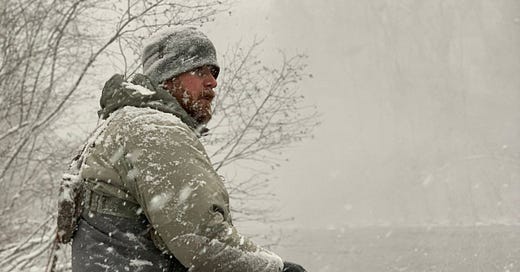



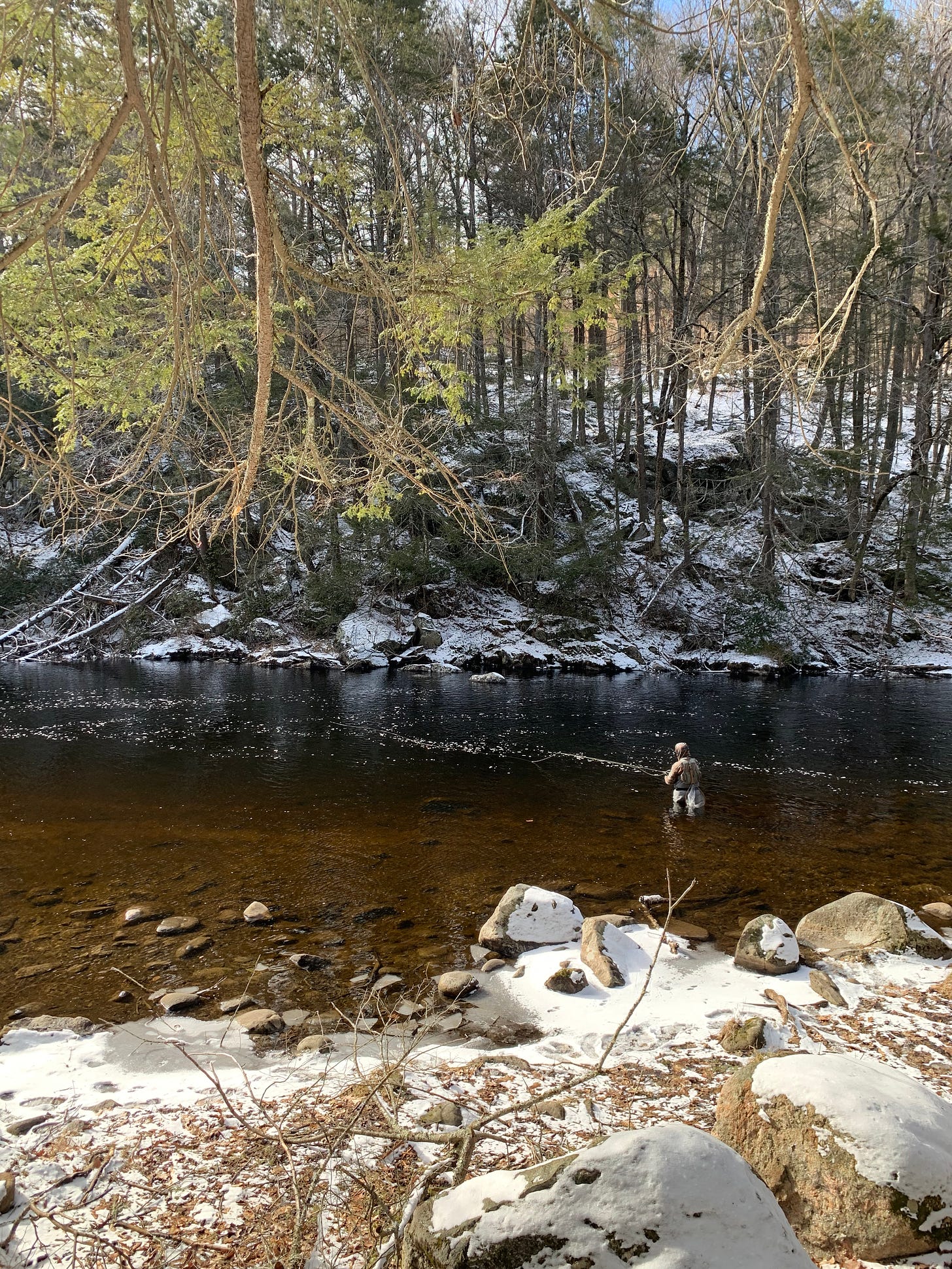
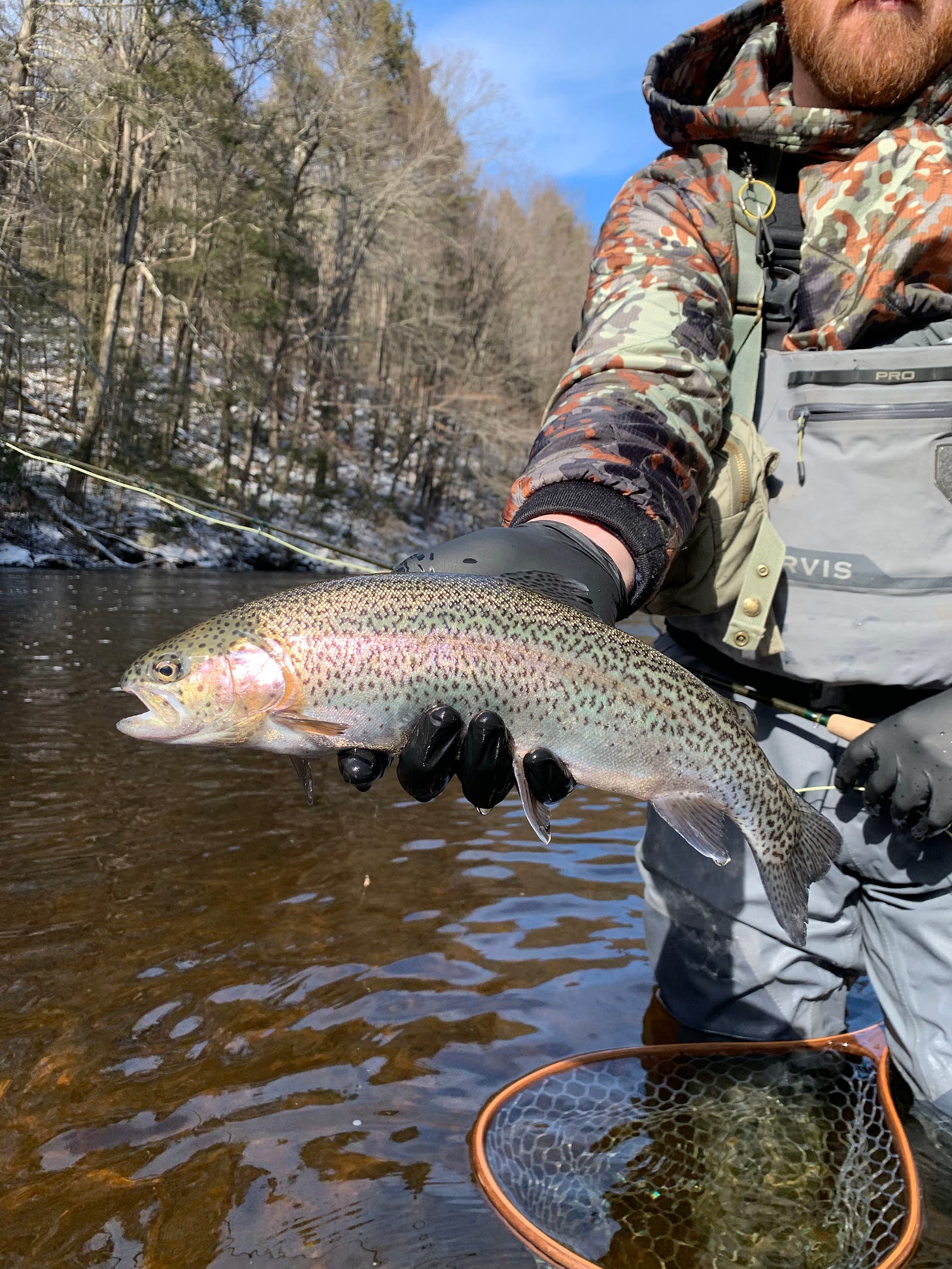
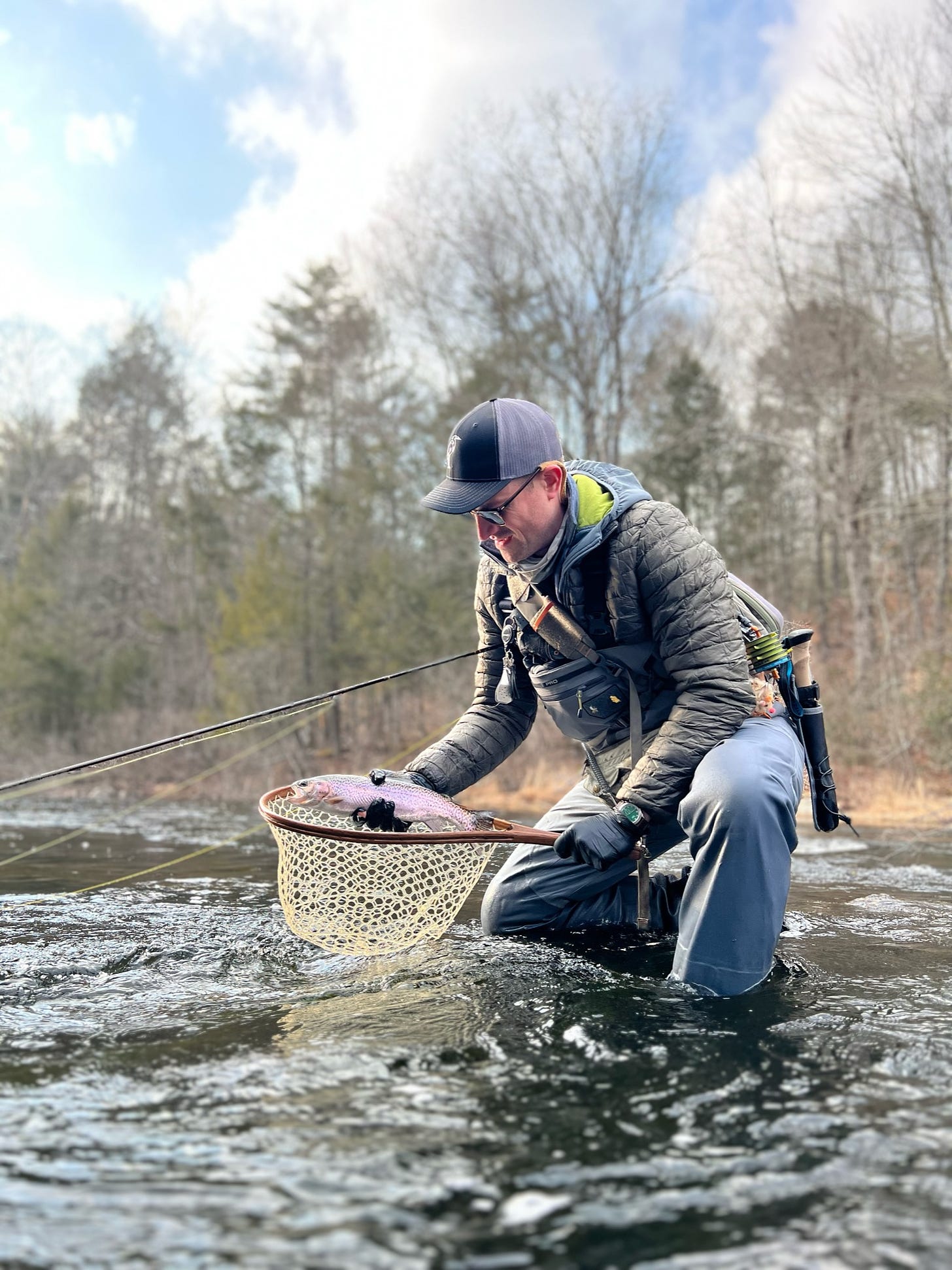
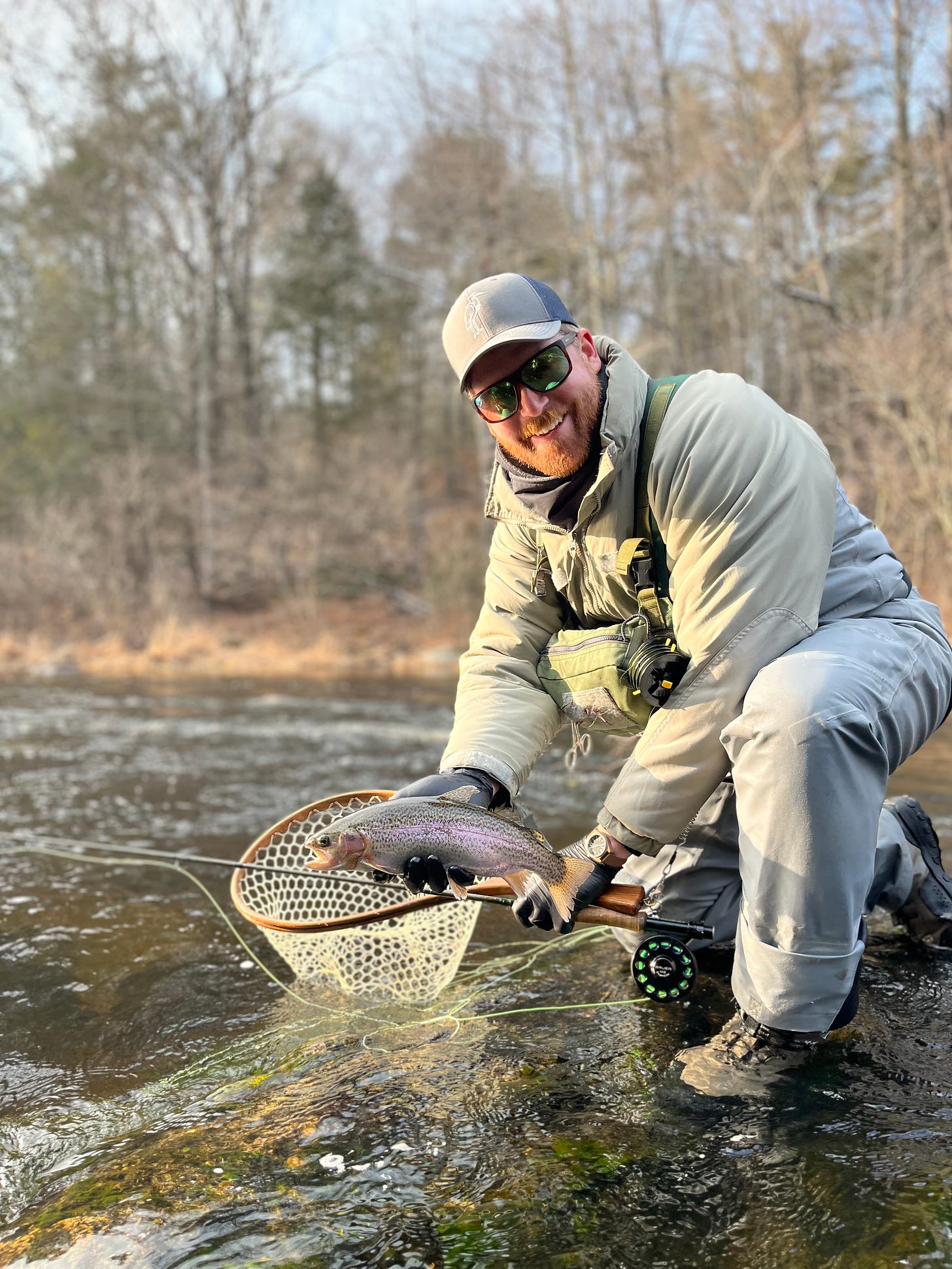
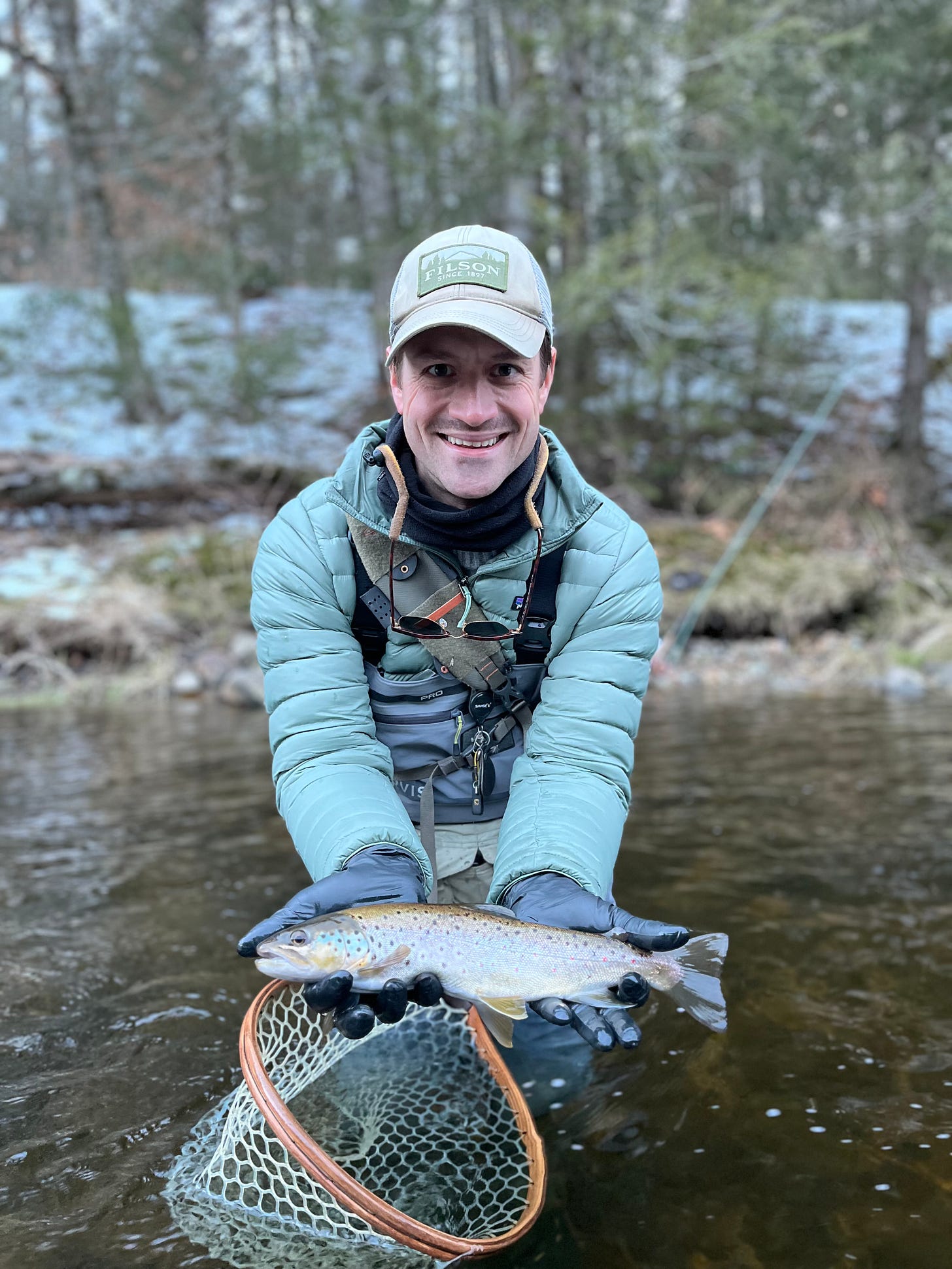
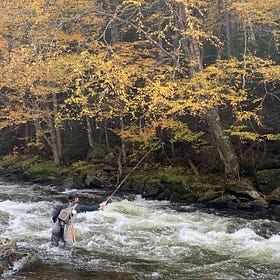

We feed the same jones here with Lake Ontario tributaries. And yes, it’s the pits. Until a steelhead decides to grab the fly. 😉
This paragraph got me:
"My heart breaks a little each time I break down my rod and toss my soggy waders into the back seat before driving home. But we learn to make peace with heartbreak. The heartbreak of losing a fish, or worse, killing one. The heartbreak of the trusty weathered rod broken in a car door. The heartbreak of knowing that someday you’ll be too frail to bear the beatings of wind and rain, too weak to fish all day without stopping for lunch. The heartbreak of discovering that one day you just can’t fish at all, or worse, have no one left to fish with."
I feel that in my bones, especially watching the generations before me grow frail. The things that break our hearts the most are the things most common to man, and frailty will one day belong to us, as you've said.